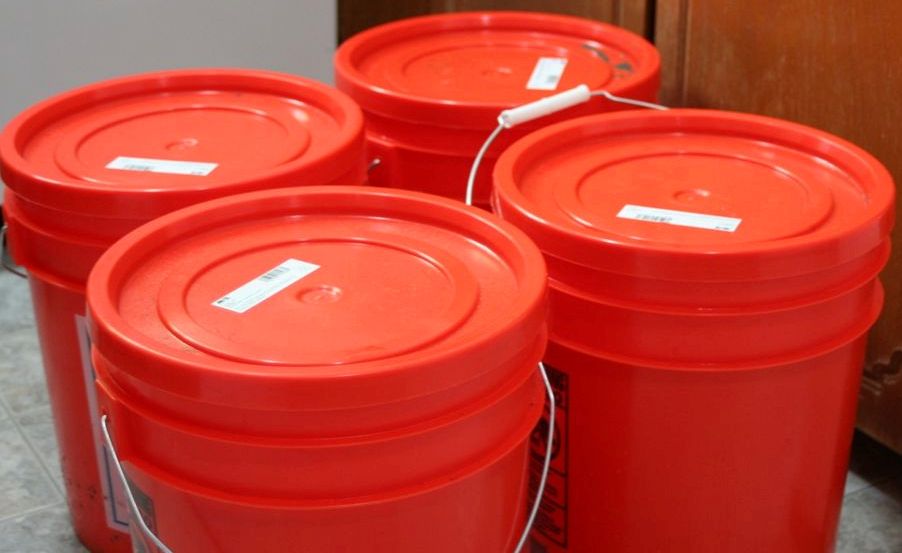
Glass: Doesn't degrade as time passes, yet easily breaks
Glass is the best option for long-term storage as the material does not break over time. Glass jars and their lids can be cleaned, sterilized and dried for storing different food items. Containers that used to hold spaghetti sauce and pickles can be reused to hold grains and beans. Furthermore, glass containers are also ideal for storing oils for extended periods.
However, care should be exercised with glass containers for food storage. The lids should be tightly screwed back on to prevent unwanted mold and insects from entering the jars. As glass easily breaks when dropped from a certain height, glass containers with food items inside should ideally be kept away from high places.
Plastic: Another viable option, though not without its risks
Given the relatively expensive price of glass, many food and beverage manufacturers have shifted to using plastic containers. Some plastic containers can be repurposed for storing food and water, but it depends on the kind of material used. Food-grade plastics are ideal for this purpose, but they are not as long-lasting compared to glass. Here are some common plastics used for food.
Polyethylene terephthalate (PETE) plastics are commonly used for soft drinks, bottled water and juices. These kinds of bottles are also used for salad dressing, ketchup and peanut butter. PETE bottles are assigned the No. 1 category for recycling, which means they are easy to recycle.
However, the thinner material means PETE bottles are still permeable – so foods kept in them tends to become rancid after two to three years. Furthermore, PETE bottles may leach out harmful chemicals when exposed to higher temperatures.
High-density polyethylene (HDPE) plastics are assigned the No. 2 recycling category. Yogurt and margarine tubs, milk jugs and large food-grade buckets are made of this material. HDPE containers are known to be very hard-wearing and does not easily break down in extreme temperatures.
Most HDPE containers are made from recycled materials themselves, so it is best to look for marks that indicate the container is ideal for food storage. These include the words "food grade" or "food safe" and the fork and cup symbol.
Low-density polyethylene (LDPE), marked as No. 4 in the plastics recycling tier, is often used for plastic wraps and bread bags. Some cooking oils are bottled in LDPE bottles. Polypropylene (PP), marked as No. 5, is often used for syrup bottles and some yogurt and margarine tubs. As PP is a more rigid plastic, it is also utilized for food-grade buckets and storage containers. (Related: Securing your stockpile: How to keep your food supplies dry and pest-free.)
Some points to take note when using plastics for storage
Storing potable water for the long-term is best done in five-gallon water jugs. These are made of food-grade HDPE plastic that last for a long time. Avoid storing filled plastic jugs directly on top of a concrete floor. A barrier between the jugs and the floor – such as plywood – will help protect the container and its contents. Rotating the water in the jugs once every year also helps ensure a fresh supply.
It is not advisable to store potable water in milk jugs as they break too easily. Biodegradable plastics should also be avoided as they are designed to break down over time. Likewise, PETE bottles should not be used to store water for extended periods as they leach toxic chemicals in the long term. (Related: Prepper storage guides: Which containers should you use to store water for stockpiling?)
However, PETE bottles are not entirely useless for food storage. Researchers from Brigham Young University (BYU) analyzed the shelf life of sunflower and canola oils kept in LDPE and PETE bottles. They found that when kept in thicker LDPE bottles, the oils had a shorter shelf life than when stored in thinner bottles.
According to the BYU researchers, canola oil had a shelf life of 6.8 years in PETE bottles compared to only 2.7 years in LDPE bottles. Meanwhile, sunflower oil kept in PETE bottles had a shelf life of 2.6 years compared to less than a year in LDPE containers.
Preparedness.news has more articles about keeping food and water for the long term.
Sources include:
Please contact us for more information.























